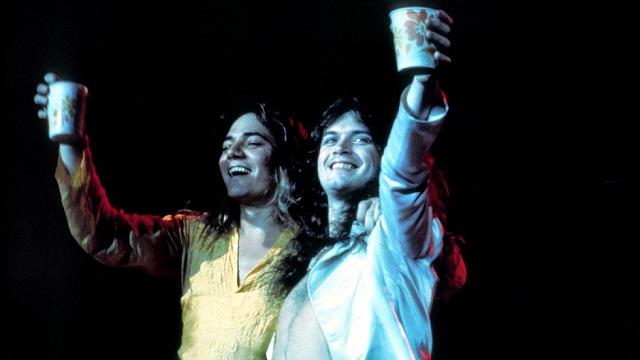When TOMMY BOLIN Joined DEEP PURPLE “He Was A Sight To Behold, This Exotic Creature”
December 17, 2023, 11 months ago

When it was announced that guitarist Ritchie Blackmore was departing Deep Purple in early 1975, it would be understandable to assume that one of the world’s most popular hard rock/heavy metal bands was caput – as Blackmore’s larger-than-life presence and seemingly effortless knack for penning classic guitar riffs/bits was unparalleled. But instead of packing it in, the remaining members of Purple – singer David Coverdale, bassist Glenn Hughes, keyboardist Jon Lord, and drummer Ian Paice – opted to give it a go with another guitarist. And that guitarist was Tommy Bolin.
Having already appeared on recordings by Zephyr (1969’s self-titled debut and 1971’s Going Back To Colorado), Billy Cobham (1973’s fusion classic Spectrum), and the James Gang (1973’s Bang! and 1974’s Miami), among others, Bolin turned out to be a worthy successor – being able to not only play rock, but also, a variety of other musical styles. Although not the chart-burner that Machine Head or Burn was, Come Taste The Band was a worldwide hit, and has developed a cult following over the years – with it rightfully being considered an oft-overlooked ‘70s rock classic.
And now, without further ado, here is an excerpt from an earlier book of mine, Touched by Magic: The Tommy Bolin Story (available for purchase as a paperback version or a Kindle download here), which focuses on Bolin joining Purple, and the creation/recording of Come Taste The Band.
David Coverdale [Deep Purple/Whitesnake/Coverdale-Page singer]: “When Ritchie Blackmore decided to go [from Deep Purple], Ritchie had invited me to go with him to do the Rainbow project. But I felt uncomfortable about it – I didn’t think it was appropriate. And that’s what led to some abrasive aspects of Ritchie’s and my relationship for a while, unfortunately. When we had a meeting without Ritchie, my recommendations were number one, Jeff Beck, number two, Rory Gallagher, and number three, this guy called Tommy Bolin, which no one had really heard about. I’d heard Tommy Bolin on the Spectrum album by Billy Cobham, and I’d heard him on Alphonse Mouzon’s album, Mind Transplant. I was really impressed with this work, and I had no idea if he was a 70-year-old African American – I had no idea. So everyone went, ‘Oh wow, he’s pretty good!’ So we sent the word out. Now at that time, Purple was this huge global entity – one of ‘the rock ‘n’ roll aristocratic bands,’ before the market was so oversaturated, as it is now. Even we couldn’t find out where he was. And we found him a few miles down the road from where I used to live in Malibu – he was living there. We arranged for him to come down and jam with us. This guy walks in with multi-colored hair, lime-green Arabian knight…they weren’t trousers, they were like pre-Steven Tyler floating pants. And on four or five inch sole platform…they weren’t platform shoes, they were kind of platform sandals!”
Glenn Hughes [Trapeze/Deep Purple/Tony Iommi singer/bassist, Black Sabbath singer, solo artist]: “He wasn’t nimble with his feet; he was falling over a lot.”
David Coverdale: “He was a sight to behold – this exotic creature. He walked up to this line of amps - which had been pretty intimidating to whoever else had been there - and turned them all to eleven. Hit a chord, and the chord got everyone off their smug ass and started jamming – immediately. All his guitars were in hock – for whichever reason – so he had borrowed a guitar for the audition. It was quite an extraordinary, explosive audition.”

Glenn Hughes: “We were rehearsing at Pirate Sound – that’s where we were ‘auditioning,’ if you will. We only auditioned two people – Clem Clempson, and then Tommy. Clem didn’t get the gig, not because of his ability as a guitar player - I think it was because to fill Ritchie Blackmore’s boots, you have to be a character. Tommy on the other hand…when I walked in and saw him, I shouted across the room, ‘Whatever happens, you’re coming home with me!’ We were just peas in the pod together. Tommy’s a Leo; he’s a sensitive, funny, and very sweet man. An artist, y’know? I saw he had the Echoplex set up on a stand, his Hiwatts, and just the way he picked up the guitar - he was going to get the job. I particularly wasn’t looking for a Ritchie Blackmore clone. Let’s just say that if Yngwie Malmsteen would have been present at that time in the ‘70s, I probably wouldn’t have wanted to go for a clone of Blackmore. As we didn’t clone [Ian] Gillan and [Roger] Glover with Coverdale and Hughes. So I think getting him in, we weren’t interested in jamming old Purple songs that day. We wanted to just forge ahead. And lo and behold, I think we started coming up with stuff immediately - that first day. For me, Paicey, and Lordy, that’s what we liked to do anyway – jam a lot. We probably shouted out some chords and drifted off into some jazz stuff. And then we probably picked up the tempo and played some really intense rock stuff. It was a very brief audition, because we knew he’d probably got the gig.”
Tommy Bolin: “When Purple first called me for an audition, I hadn’t slept in a couple days - not a wink - because I’d been up writing stuff. The rehearsal was for 4:00, and I was lying there thinking, ‘I gotta figure a way to tell them, y’know, tomorrow or something.’ And I thought, ‘Well, fuck it, I’ll just go down.’ So I walked in and I was like a zombie. But in the first tune, right away, it was smiles all around. You know, I was shocked to see how good they were, because I had never heard that much Deep Purple.”
Glenn Hughes: “It probably was [the best Purple’s ‘Mach IV’ line-up ever sounded]. Because as the annals of history know, there was some other stuff going on with substances that we didn’t really know too much about. The ‘darker’ substances were being probably used or dabbled in – opiates. Even I, who was participating in some of the things with Tommy. But yes, he did sound good at the Pirate Sound rehearsals. He got the gig, and he moved straight into my house until we found him a home. Tommy stayed at my house for about a week. We had impromptu sessions, where I’d tape stuff on my TEAC. I’ve got a bunch of those tapes – it’s just me and Tommy jamming. I would play Fender Rhodes and he would play my Les Paul – just him and I going off. I’d been going to Herbie Hancock’s quite a bit – learning how to play Fender Rhodes through Herbie, and hanging out with the Weather Report guys. And having Tommy come into my life, I was learning how to play triads on the keys and guitar – a very new way. I was learning to branch out in that world, and that’s what you heard on my solo record, [1977’s] Play Me Out. We ate from the same plate, went out a lot together, got a little high together – this was back in the years when it was kind of cool. But nobody realized he was ill with a horrible addiction.”
Johnnie Bolin [Tommy's brother, played drums for part of the Tommy Bolin Band’s 1976 tour, vice president of the Tommy Bolin Archives, Black Oak Arkansas drummer]: “Tommy ran into Ritchie when they both lived in Malibu - he invited Ritchie over. Ritchie went over to Tommy’s house, and there’s no furniture at all - there was a bed and a couch. He lived in L.A. at the time, so he had two different places. He showed Ritchie his Strat, Ritchie went to play it, and he must have had the strings on there for months. I think I remember him saying in an article, ‘He was a really nice guy, and he’s a really great guitar player. He kind of reminded me of Elvis!’ I think they got along O.K. He appreciated his playing.”
Glenn Hughes: “Well he was he different, wasn’t he? I mean, at the point, I’d only played with two [guitarists] – Mel Galley and Blackmore. Ritchie came from a very melodic, European, classical way of playing guitar. And Tommy came from a very South American-flavored, Brazilian, reggae-ish twisted, Americana way of playing guitar. It wasn’t European. It was very be-boppy, it was jazz – it was everything Deep Purple weren’t. Which I liked - and having another guy in the band that wasn’t frightened to do that, or play on instinct. So I’d bring in the soul and the funk, and Tommy would bring in that Brazilian, be-boppy, jazzy flavor. Which was a very interesting aspect. Tommy coming in was a breath of fresh air. I’ve always evolved in my music, I don’t stand still. I won’t mention names, but certain bands stand still. And we were always evolving. Come Taste The Band, look at that - it’s ‘an evolving record.’ Tommy came over to my home, and he’d already gotten a barebones structure of ‘Gettin’ Tighter.’ I helped with some of the music on that.”
Tommy Bolin: “I love that song. I wrote that at one of the rehearsals. I just thought, ‘Oh man, you know they would probably enjoy’…y’know, because I was starting to feel them out, and they were starting to feel me out, and it was like a give-and-take situation - even musically. I just kind of presented, with all the tunes, mostly the music - a riff, or whatever. I would construct the tune around it and David would take it from there, and do the lyrics, or Glenn would do the lyrics.”
Glenn Hughes: “He had come in with ‘Lady Luck’ – wrote the lyrics with Jeff Cook.”

Jeff Cook [Tommy's lyricist]: “Well unfortunately, my memories of that are not happy ones, because David Coverdale basically changed the lyrics to the song. The song was originally a sort of Steinbeck type, Cannery Row song about living in a certain part of town and wanting to break free of the poverty and so on and so forth. But a lot of that was lost when Coverdale started making up lyrics [laughs].”
Glenn Hughes: “Came in with some riffs maybe on one or two other songs. Pretty much wrote the rest of the record together as a unit. In Musicland in Germany, we were still sort of writing the record when we got there. ‘This Time Around’ was written in the studio in Munich. ‘Owed to ‘G’’ was Tommy’s instrumental that we added on to ‘This Time Around’ – it was written separately, but we forged it together.”
Tommy Bolin: “Jon and Glenn were going to call their half 'Gersh,' and I was going to call my half 'Win.’”
Greg Hampton [Producer of Whips and Roses I & II, Teaser Deluxe, & Great Gypsy Soul]: “Some of the songs and riffs that ended up on Come Taste The Band are from parts of sessions from early ’74 to ’75. I’ve heard a lot of those riffs in these multi-tracks that I’ve been listening to, that inevitably became Deep Purple songs.”
David Coverdale: “Those were interesting times. Not having the strong presence of Ritchie Blackmore was very noticeable. It was a lot more casual. Ritchie was much more work-focused and oriented – I favor that, personally. The ‘hanging around’ is interminable for me. And it was a couple of ‘social aspects’ – not necessarily with Tommy, but within the band – that could have been extremely damaging. I’m very happy that we actually came out with a worthwhile project.”
Glenn Hughes: “I guess if Tommy and I had our own druthers, we would have drifted off into our own camp – we were definitely a ‘Hughes-Bolin camp’ going on. But remember, you’ve got the lead frontman, Coverdale – that’s the way it is and that’s the way it was. But Tommy and I began to feel really comfortable playing together ‘after hours’ and hanging out.”
David Coverdale: “It’s one of my favorite projects that I’ve been involved with. It actually works very well with my Coverdale/Page project – I put a lot of my stuff in an iPod shuffle, that magically spins around like some kind of crazy digital jukebox - and whenever either Come Taste The Band follows a Coverdale/Page track or vice versa, it stands up very well. To be honest, I have no relationship with the management company of Deep Purple, who consistently scrape the barrel with Deep Purple compilation stuff. Unfortunately, for such a powerful band, we have no say in the matter. I would love to present the albums to modern rock engineers to remix, with that perspective. Y’know, like your Brendan O’Brien’s or your Kevin Shirley’s – I’d love to hear them brought up to date in a sonic way. Because I think they’d stand up very well.”
Glenn Hughes: “When you listen to Come Taste The Band, it’s a great album. It didn’t sell as much as Burn or Stormbringer, but from most people I ask from any age group; Come Taste The Band is their favorite.”
(Photos by: Richard Galbraith)











